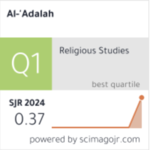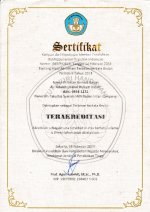Mapping the National Insight of the Salafi Group in Indonesia Based on their Fatwa on Social Media
Abstract
This article provides an overview of the national insight of the Salafi group as reflected in the lectures of their figures on the YouTube platform about saluting the flag. The aim is to enrich insight into the Salafi group in Indonesia, which is often seen from only one perspective. This study uses qualitative data with a discourse analysis approach within the framework of the study of ushūl fiqh. Discourse analysis is used to examine the statements of the preachers semantically, social cognition, and social context, while ushūl fiqh analysis is used to see their legal reasoning. Data were collected using documentation techniques from videos of lectures by Salafi preachers on digital platforms that can be used as an important space to understand their national insight. This study reveals that all Salafi preachers in Indonesia are allowed to salute the flag because this theme does not fall within the realm of faith. However, they do not recommend it to be done. This attitude is different from non-Salafi preachers who advocate it because the red and white flag is part of the struggle of Islamic scholars and Muslims. Regarding legal reasoning in fiqh, these preachers try to enter the khilāfiyah fiqh (a matter of differing opinions) space and choose an opinion that allows saluting the flag. This tendency then received a positive response from the majority of netizens. This study concludes that the Salafi group in Indonesia has used an adaptation strategy approach by utilizing rhetorical skills to avoid anti-nationalism stigma.
Keywords
Full Text:
PDFReferences
Abdurrahman, Abu, ‘Tujuh Belasan’, Dakwahmanhajsalaf.Com (Jakarta, 2019)
Ahyar, Muzayyin, and Alfitri, ‘Aksi Bela Islam: Islamic Clicktivism and The New Authority of Religious Propaganda in The Millennial Age Indonesia’, Indonesian Journal of Islam and Muslim Societies, 9.1 (2019), 1–29
Aksa, ‘Gerakan Islam Transnasional: Sebuah Nomenklatur, Sejarah Dan Pengaruhnya Di Indonesia’, Yupa: Historical Studies Journal, 1.1 (2017), 1–14
Andirja, Firanda, Apakah Hormat Kepada Bendera Termasuk Syirik (Indonesia: Abu Khalev, 2017)
———, Hukum Memajang Foto Atau Gambar Makhluk Hidup (Indonesia: Kajian Review, 2020)
Bukhari, Muhammad bin Isma’il, Al-Jami’ Al-Shahih (Beirut: Dar al-Kutub al-Ilmiyah, 1973)
Burhanuddin, ‘Hormat Bendera, Apa Salahnya?’, Ahmad.Web.Id (Jakarta, January 2005)
van Dijk, Teun A., ‘Critical Discourse Analysis’, in The Handbook of Discourse Analysis, ed. by Deborah Schiffrin, Deborah Tannen, and Heidi E. Hamilton (USA: Blackwell Publishers, 2001), pp. 352–71
Dijk, Teun A. van, ‘Principals of Critical Discourse Analysis’, Discourse & Society, 1993, 249–83
Dinata, Muhd. Farabi, ‘Qiyas Sebagai Metode Penetapan Hukum Islam’, Al-Ilmu: Jurnal Keagamaan Dan Ilmu Sosial, 5.2 (2020), 168–81
Fakfak, ‘Ustadz HTI: Haramnya Hormat Bendera Dan Nasionalisme Sama Dengan Haramnya Zina Dan Khamr’, Fak-Fak.Com (Jakarta, August 2015)
Griffel, Frank, ‘What Do We Mean By “Salafi”? Connecting Muhammad Abduh with Egypt’s Nur Party in Islam’s Contemporary Intellectual History’, Die Welt Des Islams, 55.2 (2015), 185–220
Hakim, Bashori A., ‘Wawasan Kebangsaan Kelompok Salafi Di Nusa Tenggara Barat: Studi Kelompok Salafi Di Ponpes Dārush-Shifā’’, Harmoni: Jurnal Multikultural & Multireligius, 13.2 (2014), 70–86
Hama, Hawre Hasan, ‘A Comparison Between Marxism and Islamic State’s Salafi Jihadism’, Asian Journal of Comparative Politics, 6.1 (2021), 45–61
Hamdi, Imam, ‘Kasus Hukum Abu Bakar Baasyir: Menolak Pancasila Sampai Terorisme’, Tempo.Co (Jakarta, 2019)
Hantoro, Juli, ‘Kisah 2 Siswa SMP Di Batam Tak Mau Hormat Bendera’, Tempo.Co (Jakarta, November 2019)
Hasan, Noorhaidi, Laskar Jihad: Islam, Militansi, Dan Pencarian Identitas Di Indonesia Pasca Orde-Baru (Jakarta: LP3ES, 2008)
Hasbillah, Ahmad ’Ubaydi, Nalar Tekstual Ahli Hadis Di Indonesia: Mencari Formula Kultur Berbasis Tekstualisme, 1st edn (Ciputat: Maktabah Darus-Sunnah, 2017)
Hitchcock, David, ‘Is There an Argumentum Ad Hominem Fallacy?’, On Reasoning and Argument, 30.1 (2017), 409–19
Ikhsan, M. Khoirul, Rendy Saputra, Sabrin Sabrin, and Nor Faridatunnisa, ‘Haruskah Hormat Bendera? (Deskripsi Tafsir Nusantara Atas Q.S. Al-Baqarah [2]: 34)’, in The International Conference on Quranic Studies, pp. 267–86
Iqbal, A. M., ‘Internet, Identity and Islamic Movements: The Case of Salafisme in Indonesia’, Islamika Indonesiana, 1.1 (2014), 81–105
Kau, Sofyan A. P., Zulkarnain Suleman, and Irwan Irwan, ‘Traditional Islamic Religious Practice Arguments: Criticism of The Concept of Bid’ah of Islam Salafi-Wahabi’, Al-Ulum, 23.1 (2023), 1–20
Maarif, Yahya Zainul, Apakah Hormat Kepada Bendera Adalah Sebuah Keharaman? (Indonesia: Al-Bahjah TV, 2019)
Muthohirin, Nafik, ‘Reprodukdi Salafisme: Dari Kesunyian Apolitis Menjadi Jihadis’, Sosial Budaya, 14.1 (2017), 55–62
Norman, Donald A., ‘Some Observations of Mental Models’, in Mental Models, ed. by Dedre Gentner and Albert L. Steven (New York: Psychology Press, 2014)
Olidort, Jacob, The Politics of ‘Quietist’ Salafism (Washington, D.C., 2015)
Ridwan, Cholil, ‘Rubrik Konsultasi Ulama: Hukum Hormat Bendera’, Suara Islam (Jakarta, 2011)
Smagorinsky, Peter, ‘Thinking and Speech and Protocol Analysis’, Mind, Culture, and Activity, 5.3 (1998), 157–77
Stephanie, Conney, ‘Berapa Lama Orang Indonesia Akses Internet Dan Medsos Setiap Hari?’, Kompas.Com (Jakarta, February 2021)
Undang-Undang Republik Indonesia No 24 Tahun 2009, 2009
Wahid, Din, ‘Nurturing The Salafy Manhaj: A Study of Salafi Pesantrens In Contemporary’ (Utrecht University, 2014)
DOI: http://dx.doi.org/10.24042/adalah.v21i2.19098
Refbacks
- There are currently no refbacks.
Copyright (c) 2024 Nuzul Iskandar, Mursal Mursal, Repelita Repelita
Al-'Adalah is licensed under a Creative Commons Attribution-ShareAlike 4.0 International License.




.png)
_(1).png)
_(1).png)

.png)
